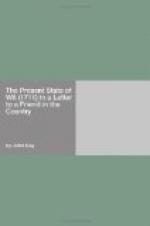“True Eubulus; we allow Poetry to be a Divine Art, and the name of Poet to be Sacred and Honourable, when a Sophocles, a Terence, a Virgil, a Corneille, a Boileau, a Shakespear, a Waller, a Dryden, a Wycherly, a Congreve, or a Garth bears it: But then we intend it as a Scandal, when we give it to Maevius, Chapelain, Ogilby, W—— D——, D——, S——, and your self.
“I question whether some Poets allow any other Poets to have Perform’d better, than themselves, in that kind of Poetry which they profess. Sir R—— B——, I suppose, tho’ he has declaim’d against Wit, yet is not so conceited, as to Vie with Horace and Juvenal for Satyr; but as to Heroick Poetry, methinks he Reasons thus with himself; Homer has writ the Ilias and the Odysseis, and Virgil only the AEneid; I have writ Prince Arthur, and King Arthur; am I not then equal to Homer, and Superior to Virgil? No, B——re, we judge of Poetry as we do of Metals, nor by the Lump, but the intrinsick Value. New cast your Poems; purge ’em of their Dross; reduce ’em to the Bulk of the Dispensary, and if then they weigh in the Balance with that, we will allow you a Place among the First-Rate Heroick Poets.
“The Wits of mean Descent and scanty Fortune, are generally apt to reflect on Persons of Quality and Estates, whom they rashly tax with Dullness and Ignorance, a Normanby, a Dorset, a Spencer, a Hallifax, a Boyle, a Stanhope, and a Codrington, (to pass over abundance more) are sufficient to convince the World, that either an Ilustrious Birth, or vast Riches, are not incompatible with deep Learning, and Sterling-Wit.
“Rapin, St. Evremont, and some other French Criticks, do the English wrong, in the Judgments they pass upon their Plays: The English Criticks are even with them, for generally they judge as ill of French Poetry.
“There is a great reach of Discernment, a deep Knowledge, and abundance of Candor requir’d to qualifie a Man for an equal Judge of the Poetry and ingenious Compositions of two Nations, whose Tempers, Humours, Manners, Customs, and Tastes, are so vastly different as the French are from the English: Rapin, St. Evremont, and Rymer, are candid, judicious, and learned Criticks, I own it; but yet neither the two first are sufficiently acquainted with England, nor the latter with France, to enter equally into the Genius of both Nations; and consequently they cannot pass a just Sentence upon the Performances of their respective Writers.
“Tis a great piece of Injustice in us, to charge the French with Fickleness; for, to give them their due, They are ten times more constant in their Judgments, than we; Their Cid and Iphigenia in Aulis, are Acted at this very day, with as much Applause as they were thirty Years ago: All London has admir’d the Mourning Bride one Winter, and endeavoured to find fault with it the next.




